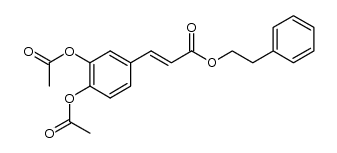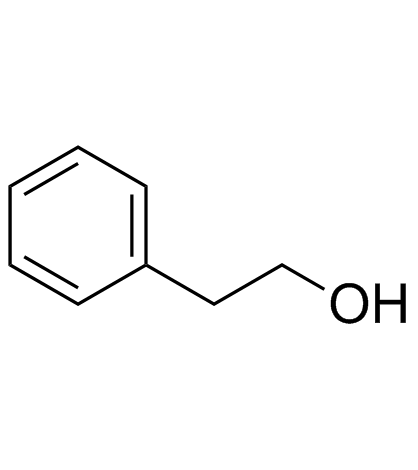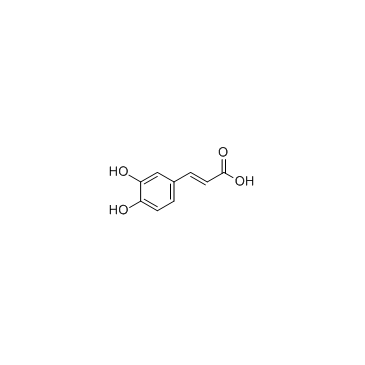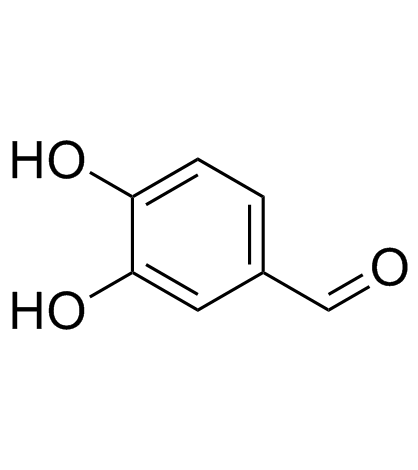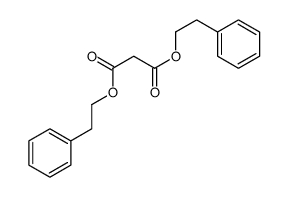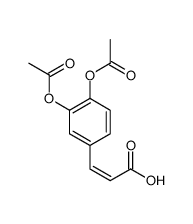咖啡酸苯乙酯
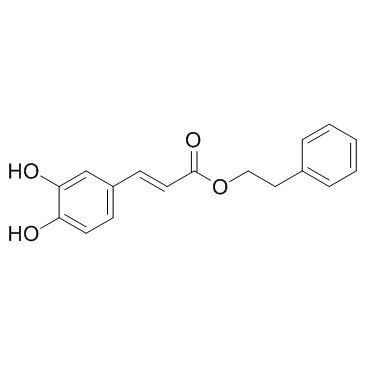
咖啡酸苯乙酯结构式

|
常用名 | 咖啡酸苯乙酯 | 英文名 | Caffeic acid phenethyl ester |
|---|---|---|---|---|
| CAS号 | 104594-70-9 | 分子量 | 284.306 | |
| 密度 | 1.3±0.1 g/cm3 | 沸点 | 498.6±45.0 °C at 760 mmHg | |
| 分子式 | C17H16O4 | 熔点 | 129 °C | |
| MSDS | 美版 | 闪点 | 185.1±22.2 °C |
咖啡酸苯乙酯用途Caffeic acid phenethyl ester 是一种 NF-κB 抑制剂。 |
| 中文名 | 咖啡酸苯乙酯 |
|---|---|
| 英文名 | phenethyl caffeate |
| 中文别名 | 咖啡酸β-苯乙醇酯 |
| 英文别名 | 更多 |
| 描述 | Caffeic acid phenethyl ester 是一种 NF-κB 抑制剂。 |
|---|---|
| 相关类别 | |
| 靶点 |
NF-κB |
| 体外研究 | 咖啡酸苯乙酯是NF-κB抑制剂。剂量依赖性地通过咖啡酸苯乙酯(CAPE)处理显着抑制CRPC细胞系的细胞存活和增殖。咖啡酸苯乙酯的生长抑制作用在处理后24小时内是明显的,但抑制作用随时间累积。在LNCaP 104-R1细胞上24,48,72和96小时的咖啡酸苯乙酯处理的IC50分别为64.0,30.5,20.5和18.0μM。菌落形成测定显示用10μM咖啡酸苯乙酯处理使LNCaP 104-R1细胞的集落形成减少90%,而用20μM咖啡酸苯乙酯处理完全阻断LNCaP 104-R1集落的形成。流式细胞术分析显示,在咖啡酸苯乙酯处理下,LNCaP104-R1细胞中S期和G2/M期细胞减少但G1期细胞群中细胞增加。咖啡酸苯乙酯处理也显着降低脂肪酸合成酶(FAS),视网膜母细胞瘤蛋白(Rb),磷酸化Rb Ser807/811,c-Myc,p70S6激酶,磷酸化p70S6激酶Thr421/Ser424,Skp2,p90RSK和NF的蛋白质水平。 -κBp65[1]。 |
| 体内研究 | 通过管饲法(10mg/kg体重/天)给予咖啡酸苯乙酯(CAPE)8周导致肿瘤体积减少50%,表明咖啡酸苯乙酯处理延迟了LNCaP104-R1异种移植物的生长。咖啡酸苯乙酯灌胃减缓了LNCaP 104-R1细胞的肿瘤生长,这与我们观察到的一致,即我们观察到咖啡酸苯乙酯处理诱导细胞周期停滞但不诱导细胞凋亡[1]。 |
| 激酶实验 | 用0,10,20或40μM咖啡酸苯乙酯(CAPE)处理LNCaP 104-R1细胞96小时。在含有DTT,蛋白酶抑制剂和磷酸酶抑制剂混合物的SDS裂解缓冲液(240mM Tris-乙酸盐,1%SDS,1%甘油,5mM EDTA,pH8.0)中裂解细胞的三个生物复制物。进行Micro-Western Arrays测量蛋白质表达和磷酸化状态修饰[1]。 |
| 细胞实验 | 将LNCaP 104-R1细胞以每孔3×10 3个细胞的密度接种在96孔板中。 24小时后,用递增浓度的咖啡酸苯乙酯(CAPE)处理细胞96小时。通过MTT(3,4,5-二甲基噻唑-2-基)-2-5-二苯基四唑溴化物)测定评估细胞活力。通过使用读板器测量560nm处的吸光度来确定甲amount的量。将所有结果标准化为每个单独实验中对照条件的平均值。所有实验重复三次。每次对每种条件使用10个孔。平均值和标准偏差代表三次实验中所有30口井的结果[1]。 |
| 动物实验 | 将6至8周龄的雄性Balb / c nu / nu小鼠皮下注射到两侧,将5×105 LNCaP 104-R1细胞悬浮于0.5mL Matrigel中,并皮下注射到无胸腺小鼠中以形成肿瘤。 14周后,平均肿瘤体积超过150mm 3。然后将小鼠分成对照组和咖啡酸苯乙酯(CAPE)处理组。对照组含有6只小鼠和8只肿瘤,而咖啡酸苯乙酯处理组含有6只小鼠和9只肿瘤。从癌细胞注射后第14周开始通过管饲法施用咖啡酸苯乙酯(芝麻油中10mg / kg /天)或载体(芝麻油)。使用卡尺每周测量携带104-R1异种移植物的小鼠的肿瘤体积和体重,并使用公式体积=长度×宽度×高度×0.52 [1]计算体积。 |
| 参考文献 |
| 密度 | 1.3±0.1 g/cm3 |
|---|---|
| 沸点 | 498.6±45.0 °C at 760 mmHg |
| 熔点 | 129 °C |
| 分子式 | C17H16O4 |
| 分子量 | 284.306 |
| 闪点 | 185.1±22.2 °C |
| 精确质量 | 284.104858 |
| PSA | 66.76000 |
| LogP | 3.38 |
| 外观性状 | 固体;White to Orange to Green powder to crystal |
| 蒸汽压 | 0.0±1.3 mmHg at 25°C |
| 折射率 | 1.646 |
| 储存条件 | 密封储存,储存于阴凉、干燥的库房。冷藏温度为-20ºC。 |
| 稳定性 | 常温常压下稳定,避免与强氧化剂接触。 |
| 分子结构 | 1、摩尔折射率:81.43 2、摩尔体积(cm3/mol):224.4 3、等张比容(90.2K):616.7 4、表面张力(dyne/cm):56.9 5、介电常数:无可用的 6、极化率(10-24cm3):32.28 7、单一同位素质量:284.104859 Da 8、标称质量:284 Da 9、平均质量:284.3065 Da |
| 计算化学 | 1、 疏水参数计算参考值(XlogP):4.2 2、 氢键供体数量:2 3、 氢键受体数量:4 4、 可旋转化学键数量:6 5、 互变异构体数量:10 6、 拓扑分子极性表面积(TPSA):66.8 7、 重原子数量:21 8、 表面电荷:0 9、 复杂度:347 10、同位素原子数量:0 11、确定原子立构中心数量:0 12、不确定原子立构中心数量:0 13、确定化学键立构中心数量:1 14、不确定化学键立构中心数量:0 15、共价键单元数量:1 |
| 个人防护装备 | dust mask type N95 (US);Eyeshields;Gloves |
|---|---|
| 危害码 (欧洲) | Xi: Irritant; |
| 风险声明 (欧洲) | R36/37/38 |
| 安全声明 (欧洲) | S26-S36 |
| 危险品运输编码 | NONH for all modes of transport |
| RTECS号 | UD3334375 |
| 海关编码 | 2918290000 |
|
~74% 
咖啡酸苯乙酯 104594-70-9 |
| 文献:European Journal of Medicinal Chemistry, , vol. 75, p. 391 - 402 |
|
~61% 
咖啡酸苯乙酯 104594-70-9 |
| 文献:EP1211237 A1, ; Example 1 ; |
|
~84% 
咖啡酸苯乙酯 104594-70-9 |
| 文献:Journal of Chemical Research, , # 5 p. 332 - 334 |
|
~70% 
咖啡酸苯乙酯 104594-70-9 |
| 文献:Chemical and Pharmaceutical Bulletin, , vol. 49, # 2 p. 236 - 238 |
|
~% 
咖啡酸苯乙酯 104594-70-9 |
| 文献:Bioorganic and Medicinal Chemistry, , vol. 10, # 10 p. 3351 - 3359 |
|
~% 
咖啡酸苯乙酯 104594-70-9 |
| 文献:Bioorganic and Medicinal Chemistry, , vol. 10, # 10 p. 3351 - 3359 |
|
~% 
咖啡酸苯乙酯 104594-70-9 |
| 文献:Journal of Chemical Research, , # 9 p. 586 - 588 |
|
~% 
咖啡酸苯乙酯 104594-70-9 |
| 文献:Journal of Chemical Research, , # 5 p. 332 - 334 |
|
~% 
咖啡酸苯乙酯 104594-70-9 |
| 文献:European Journal of Medicinal Chemistry, , vol. 75, p. 391 - 402 |
| 海关编码 | 2918290000 |
|---|---|
| 中文概述 | 2918290000 其他含酚基但不含其他含氧基羧酸及其酸酐、酰卤化物、过氧化物和过氧酸及它们的衍生物。监管条件:AB(入境货物通关单,出境货物通关单)。增值税率:17.0%。退税率:9.0%。最惠国关税:6.5%。普通关税:30.0% |
| 申报要素 | 品名, 成分含量, 用途 |
| 监管条件 | A.入境货物通关单 B.出境货物通关单 |
| 检验检疫 | R.进口食品卫生监督检验 S.出口食品卫生监督检验 |
| Summary | HS: 2918290000 other carboxylic acids with phenol function but without other oxygen function, their anhydrides, halides, peroxides, peroxyacids and their derivatives Tax rebate rate:9.0% Supervision conditions:AB(certificate of inspection for goods inward,certificate of inspection for goods outward) VAT:17.0% MFN tariff:6.5% General tariff:30.0% |
|
Ganglioside GM3 is required for caffeic acid phenethyl ester-induced megakaryocytic differentiation of human chronic myelogenous leukemia K562 cells.
Biochem. Cell Biol. 92(4) , 243-9, (2014) The human chronic myelogenous cell line K562 has been used extensively as a model for the study of leukemia differentiation. We show here that treatment of K562 cells with caffeic acid phenethyl ester... |
|
|
Inhibition of COX-2-mediated eicosanoid production plays a major role in the anti-inflammatory effects of the endocannabinoid N-docosahexaenoylethanolamine (DHEA) in macrophages.
Br. J. Pharmacol. 172(1) , 24-37, (2014) N-docosahexaenoylethanolamine (DHEA) is the ethanolamine conjugate of the long-chain polyunsaturated n-3 fatty acid docosahexaenoic (DHA; 22: 6n-3). Its concentration in animal tissues and human plasm... |
|
|
Effects of caffeic acid phenethyl ester on wound healing in calvarial defects.
Acta Odontol. Scand. 73(1) , 21-7, (2014) The aim of this study is to analyze histologically the effect of CAPE on bone healing of Critical Size Defect (CSD) in rat calvaria.Thirty-two 3-month-old male rats were used. The animals were randoml... |
| Phenethyl 3-(3,4-dihydroxyphenyl)acrylate |
| Phenylethyl caffeate |
| Phenethyl caffeate |
| 2-Phenyethyl caffeate |
| 2-Phenylethyl (2E)-3-(3,4-dihydroxyphenyl)acrylate |
| CAPE |
| 2-Propenoic acid, 3-(3,4-dihydroxyphenyl)-, 2-phenylethyl ester, (E)- |
| Phenethyl 3,4-Dihydroxycinnamate |
| MFCD00866470 |
| 2-phenylethyl (2E)-3-(3,4-dihydroxyphenyl)prop-2-enoate |
| Caffeic acid phenethyl ester |
| 3,4-Dihydroxycinnamic Acid Phenethyl Ester |
| Caffeic acid 2-phenylethyl ester |
| Caffeic Acid phenylethyl ester |
| 2-Phenylethyl caffeate |
| 2-Phenylethyl caffeoate |
| 2-Propenoic acid, 3-(3,4-dihydroxyphenyl)-, 2-phenylethyl ester, (2E)- |

